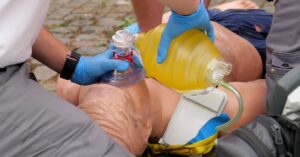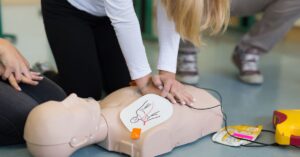Emergencies demand quick thinking and the ability to remain calm under pressure. Maintaining composure can benefit outcomes during a medical crisis or natural disaster. Here are tips for managing stress in emergency situations so you can respond more effectively.
Focus on Breathing
Breathing is a powerful stress management tool. Controlled deep breaths can lower your heart rate, allowing you to regain clarity and focus. Practice this deep breathing exercise when in a crisis:
- Inhale through your nose for a count of four.
- Hold your breath for four beats.
- Exhale through your mouth for another count of four.
Repeat this cycle until you feel your tension reducing. This simple technique calms nerves when facing the unexpected.
Prioritize Tasks
Rapid response is vital in an emergency, as it affects the outcome of a chaotic situation. Focus on immediate threats first, such as calling for help or assisting someone in need. Create a mental checklist, first addressing the most crucial tasks and then working methodically through each one. This approach helps maintain order amidst chaos.
Stay Informed
Knowledge empowers action. Familiarize yourself with emergency procedures relevant to your environment, whether at home or work or in a public space. Knowing what to do can reduce panic so you can make informed decisions.
Rely on Training
Training prepares individuals to act swiftly and confidently. Regularly practicing emergency protocols, such as fire drills or first aid, embeds these actions into muscle memory, enabling faster responses during actual events. Organizations like CPR123 offer courses that provide lifesaving skills to ensure individuals are aware and ready to act.
Communicate Clearly
Clear communication prevents misunderstandings and facilitates teamwork. Use simple, direct language when conveying information or instructions to others. Ensure you understand your part in the emergency, especially when guiding others on how to assist. Effective communication can streamline efforts and reduce stress for everyone involved.
Practice Mindfulness
Mindfulness techniques allow individuals to be present and focused, even under pressure. Techniques such as body scans or guided imagery calm your body and improve your mindset when you’re responding to an emergency.
Seek Support
Do not hesitate to reach out for assistance when needed. Whether calling emergency services or enlisting the help of bystanders, collaboration can improve outcomes. Remember, you do not need to handle everything alone—support can relieve pressure and facilitate effective resolutions.
Respond Better With a Training Course From CPR123
By using these tips for managing stress in emergencies, you can take initiative and respond effectively when needed. Preparation is the key to confidently navigating emergencies. Use resources such as CPR123’s AHA BLS certification to empower yourself with the knowledge and skills necessary for life’s unexpected challenges. Get certified so you can respond helpfully in a crisis.







